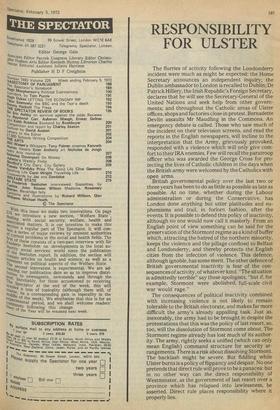RESPONSIBILITY FOR ULSTER
The flurries of activity following the Londonderry incident were much as might be expected: the Home Secretary announces an independent inquiry; the Dublin ambassador to London is recalled to Dublin; Dr Patrick Hillery, the Irish Republic's Foreign Secretary, declares that he will see the Secretary-General of the United Nations and seek help from other governments; and throughout the Catholic areas of Ulster offices, shops and factories close in protest. Bernadette Devlin assaults Mr Maudling in the Commons. An emergency debate is called. Those who saw much of the incident on their television screens, and read the reports in the English newspapers, will incline to the interpretation that the Army, grievously provoked, responded with a violence which will only give comfort to their IRA enemies. Few will recall the paratroop officer who was awarded the George Cross for protecting the lives of Catholic children in the days when the British army were welcomed by the Catholics with open arms. British governmental policy over the last two or three years has been to do as little as possible as late as possible. At no time, whether during the Labour administration or during the Conservative, has London done anything but utter platitudes and euphemisms and trail, in forlorn fashion, after the events. It is possible to defend this policy of inactivity, although no one would now call it masterly. From an English point of view something can be said for the preservation of the Stormont regime as a kind of buffer which, attracting the hatred of the northern minority, keeps the violence and the pillage confined to Belfast and Londonderry, and thereby protects the English cities from the infection of violence. This defence, although ignoble, has some merit. The other defence of British governmental inactivity is fear of the consequences of activity, of whatever kind. "The situation is admittedly terrible" say these apologists, "but if, for example, Stormont were abolished, full-scale civil war would rage." The consequences of political inactivity combined with increasing violence is not likely to remain tolerable to the British electorate, and makes far more difficult the army's already appalling task. Just as, inexorably, the army had to be brought in despite the protestations that this was the policy of last resort, so, too, will the dissolution of Stormont come about. The Stormont regime already has lost much of its authority. The army, rightly seeks a unified (which can only mean English) command structure for security arrangements. There is a risk about dissolving Stormont. The backlash might be severe. But fiddling while Ulster burns is a policy of flippancy and despair. No one pretends that direct rule will prove to be a panacea: but in no other way can the direct responsibility of Westminster, as the government of last resort over a province which has relapsed into lawlessness, be asserted. Direct rule places responsibility where it properly lies.










































 Previous page
Previous page